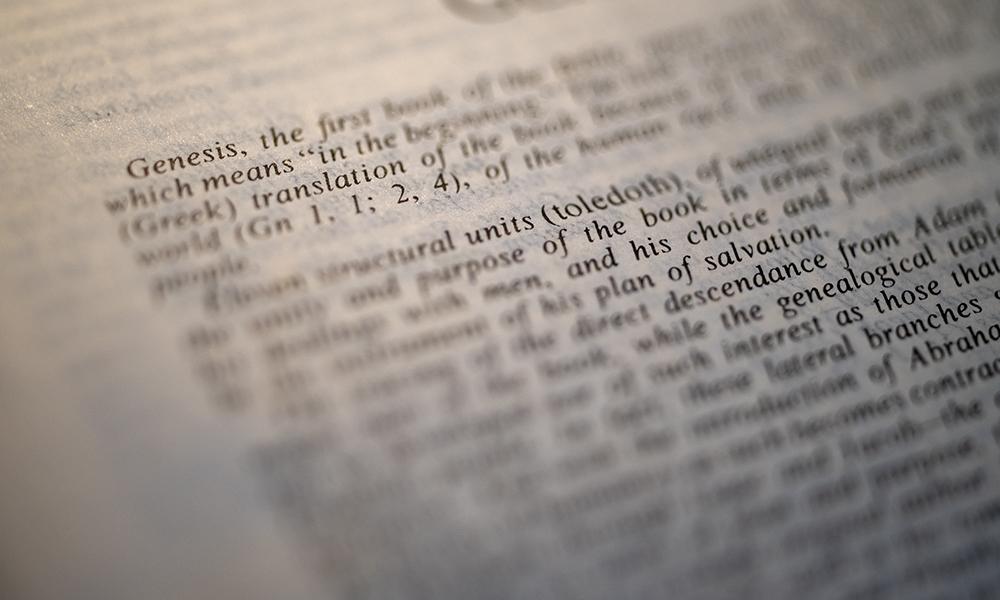
Prudence Will Watch Over You – Part 4
Welcome to the next installment of our moral discernment of COVID-19 vaccination. Over the last two weeks, we have discussed the two major moral dimensions of the vaccines: bioethical concerns about their relationship to abortion, and social concerns about how they interact with our responsibility for the common good. The main take-aways were the Church’s guidance that we can receive the currently available vaccines in good conscience, and that receiving vaccination and helping others do so is a genuine contribution to the common good.
This week, we will begin a reflection on the Bible’s perspective on disease and public health. This is not just an ornament on our previous discussion but something integral to it. Sacred Scripture has a way of firing the imagination and inspiring us to action in ways that reflections in philosophical language have trouble doing: “The Lord’s testimony gives wisdom to the simple” (Psalm 19:7). Our imaginative participation in the poetry and stories of the Bible, in union with the Church’s teaching and tradition, leads us to a true encounter with Christ and produces much fruit in our lives. This week, we begin with a reflection on disease and health in the Old Testament, to be followed by the Good News of the New Testament next week.
In the Beginning …
In the opening chapters of Genesis, we find that disease was not part of God’s plan for the world. As we read through the majestic sweep of Genesis 1, we see an orderly and thoughtful arrangement of all its parts: sun and stars, earth and sea, plants and animals, and humankind, all in perfect harmony. The Lord called His creation “very good,” because His craftmanship was perfect, with everything arranged in tranquility.
But somewhere along the way, something went wrong: sin and evil entered the world, disrupting creation’s harmony. The good and fruitful earth started to produce thorns (Genesis 3:18), and pain was transformed from simple information into true suffering (Genesis 3:16). Sin led not just to the disruption of individual happiness, but to the disruption of society, as brother turned against brother (Genesis 4:1-16), and ultimately even the earth was contaminated by sin (Genesis 4:10).
The Law of Moses brought disease into further focus. In the Book of Leviticus, the laws of Israel focused on three major issues: justice within society; public health (through dietary and quarantine laws); and right worship. Interestingly, the Law treats the problems of sin and infectious disease very similarly. Both lepers and sinners were excluded from the community (as in Leviticus 13 and 18:24-30), and the restoration of a sinner or a disease victim required similar sacrifices (in Leviticus 14 and 16). In other words, both contagious diseases and sin “go airborne,” infecting others and endangering communities.
This gives us a key lesson about public health from the Old Testament: as members of a community, we all share responsibility for each other’s moral and physical well-being, and the bodily or spiritual illness of one hurts us all. In the present moment, we need to be very aware of how our individual choices about health practices and moral responsibility affect those around us.
Prophetic Promises
Despite the wisdom of the Law of Moses, the spread of disease remained mysterious in ancient times. The prophets often interpreted plagues as a sign of God’s punishment of sin. When King David’s pride grew too great, the prophet Nathan warned of a coming disease outbreak (2 Samuel 24:10-17). Similarly, Jeremiah declared that Jerusalem’s failure to establish justice for poor laborers would result in the city dying by war, famine, and plague (Jeremiah 34:8-17).
In stories like these, we should keep in mind that God never personally causes evil. His work of creating and sustaining everything is always “very good,” even if sometimes He permits the evil that comes from our bad choices. In spite of Israel’s mistakes, God continued to hold out the promise of a path to spiritual and physical health. The repentant King Hezekiah’s illness (Isaiah 38) was healed by a fig-based remedy from the prophet Isaiah—but his recovery is attributed to the Lord. The restoration of health comes through collaboration between human skill and divine goodness. God allows us to participate in His work of restoring creation to the way He intended it to be. The wonder of modern medicine, which has produced vaccines against COVID-19 in record time, is a good example of this collaboration.
On a positive note, the prophets speak of health as a result of God doing surgery on the world: “‘I will heal your wounds,’ says the Lord” (Jeremiah 30:17). Isaiah promises that all nations will be healed by the Lord, which will take place through humankind joining together in the right worship of God (Isaiah 56:1-8) and through the establishment of justice for all members of the Lord’s community (Isaiah 58:6-12). The result of this will be such health that “he who lives to be only 100 years old is thought to have died young” (Isaiah 65:20).
The prophets teach us that moments of disease can be occasions for repentance. As we encounter our human insufficiency, we learn to place our trust in God. They also help us learn what it means to wait in hope: the Lord is planning to do something about the combined problem of sin and disease.
Wisdom and the Mystery of Disease
The Wisdom literature of the Old Testament reflects deeply on the remaining traces of the order that God established in the beginning, hidden but truly present, despite sin and evil. This order shows up especially in human decision making. For example, Sirach starts from the Law of Moses to find the beauty of creation, which leads him to describe remedies for disease, discoverable by human wisdom, as a sign of God’s goodness (Sirach 38:2-7). Those who heal others give honor to God, and a good physician is an image of virtue: wise in knowing how to give God’s healing to others, and just in giving that healing generously. Medicine is one way in which prudence watches over the righteous (Proverbs 2:11).
Even with this positive perspective on creation, people who suffer from illness still confront a real difficulty. The Book of Job describes it most clearly, in pages of anguished poetry. While disease and sin are interrelated, their connection presents a riddle: if someone hasn’t committed grave sin, how is it fair for God to allow others’ sin to harm them? In modern terms, when the physical, economic, and social effects of pandemics fall disproportionately on weak and innocent members of a community, where is justice?
Job himself never quite arrives at a full answer to this mystery, but he has an encounter with God (Job 38–41) and is satisfied that the question has an answer. There has to be more to creation, more to humankind, than just sin and disease, but we can’t quite arrive at that goodness by our own efforts. Somehow God Himself will have to break the boundaries of evil and death, if health and justice are to be truly restored to creation and human society.
And at this point, the Old Testament has asked its deepest question: how can God possibly make things right? The answer, of course, is found in the New Testament—the topic of our discussion next week!
(This article first appeared in the Feb. 12, 2021 issue of the One Voice newspaper.)


